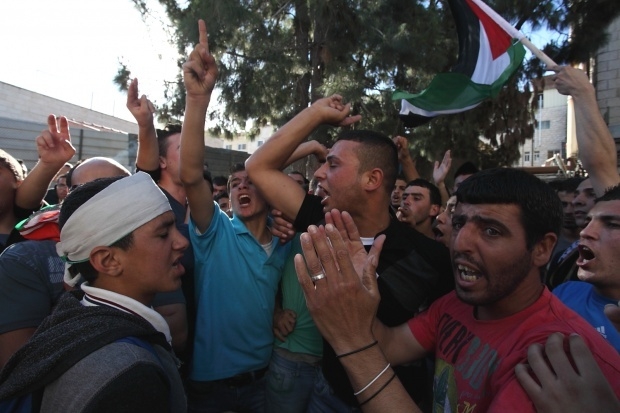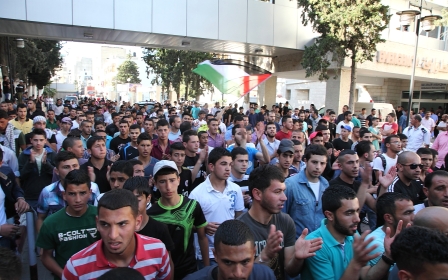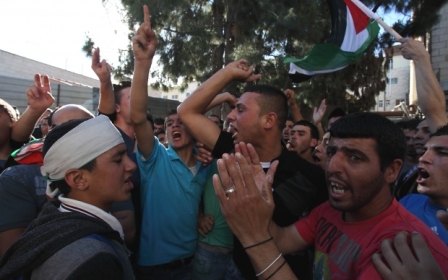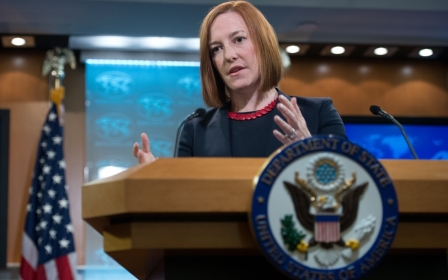Family of slain Palestinian child to take legal action against Israel

RAMALLAH - Sitting in the living room of his Ramallah home, Siam Nuwara opened his telephone and flipped through pictures of Nadim, his 17-year-old son who was shot and killed by the Israeli military during a protest on 15 May.
Palestinian, Israeli and international human rights groups regularly decry Israel’s treatment of Palestinian children, which includes detention, arrest, interrogation and physical force at demonstrations and elsewhere.
In a report released this week entitled 'Killing of Children, Apparent War Crime' , Human Rights Watch said the killing of the two Palestinian teenagers by Israeli military forces might be a war crime.
“Israel says our children are a threat,” Siam told Middle East Eye. “But look how innocent Nadim was.”
Referring to another 16-year-old Palestinian boy who was killed during the same demonstration, he asked: “How could Nadim and Muhammad Abu al-Thahir pose a threat to one of the strongest armies in the world?”
Siam’s photographs of Nadim paint the image of a fun-loving child who loved listening to Lil Wayne’s rap music and playing sports, including mixed martial arts and basketball. He added that Nadim had been preparing to apply to universities in the United States, where several of his uncles, aunts and cousins live.
Siam and his family plan to take legal action against Israel in both international and Israeli courts.
'My son really is dead'
Before releasing an official statement, the Israeli military floated a number of potential explanations in the media about the killings which were caught on tape by nearby security cameras and CNN.
Speaking to the Israeli daily Haaretz shortly after the killings, military investigators and senior officials claimed that the video footage was “likely forged” and that a Palestinian sniper may have killed the children.
Michael Oren, a former Israeli ambassador to the US, told CNN that the boys might not have died at all.
Nearly two weeks after the killings took place, the Israeli military released its first official comment to Haaretz, claiming that a non-combat soldier fired a rubber-coated steel bullet in violation of military regulations. It also claimed that Israeli forces did not use live ammunition during that protest.
Siam dismissed these claims. “Four persons were hit with live ammunition,” he said. “Where did it come from? And how could we forge private security cameras and CNN footage?”
The Nuwara family also later found the bullet - which passed through his chest and came out of his back - in his blood-soaked backpack.
“Of course it hurts to hear the Israelis saying these lies about my son,” he said. “He really is a martyr. My son really is dead.”
Legal plans
To dispel the claims about his son, Siam plans to have Nadim’s body exhumed and make public the results of an autopsy. “I will try to go to an international court,” he said. “And even though there is no hope for justice in Israel’s courts, I also want to go there.”
Siam believes that an international investigation could clarify whether the decision to fire live ammunition that day was an individual choice or a military order. “If we can find out whoever made that decision, we can determine whether they have a second nationality. If that’s the case, the person responsible for Nadim’s death might face trial in that country.”
Ayed Abu Eqtaish, an advocacy officer for Defence for Children International - Palestine (DCI-Palestine), a group that monitors human rights abuses against children in the occupied Palestinian territories, explained that three human rights groups are presently gathering evidence and conducting a joint investigation.
Along with DCI-Palestine, the Palestinian rights group Al-Haq and the Israeli organization B’Tselem will work together to determine the optimal route to proceed according to international law.
The Palestinian Authority is conducting a separate independent investigation.
Abu Eqtaish added that Israel’s claims have yet to be substantiated because the army has yet to make any evidence public. Witnesses have recounted Israeli forces filming the protests around the time that Nuwara and Abu al-Thahir were killed, he said, and the military should “make the videos public” to support their claims.
Sarit Michaeli, director of B’Tselem, said that the Israeli military has failed to disprove the claims of witnesses and human rights workers. “Aside from smearing the Nuwara family and Palestinians for supposedly doctoring the footage, the military hasn’t really provided an alternative explanation,” she told Middle East Eye.
Michaeli also noted that an autopsy will “hopefully shed light on his injury because it is quite easy to ascertain the difference between a rubber bullet and fragments of a live bullet,” adding that both the body and the bullet “need to be subjected to ballistics and forensics examinations.”
Open-fire regulations
Since the beginning of the Second Palestinian Intifada (Arabic for “uprising”) in 2000, Israel has lessened its enforcement of open-fire regulations, the rules regarding the use of live ammunition, according to B’Tselem.
The lax regulations have partially been made possible by the lack of public pressure on the army for transparency and the increasingly anti-Palestinian sentiment in Israel, Michaeli explained.
Those regulations nonetheless specify that a soldier cannot fire live ammunition unless he or she is faced with mortal danger.
Yet shooting has been the most frequent cause of Palestinian deaths at the hands of Israeli forces during clashes that involved stone-throwing, Michaeli observed, adding that Israeli soldiers and border police officers often use live ammunition at Ofer military prison, where Nuwara and Abu al-Thahir were shot and killed.
“Practically speaking, regarding the actual events that occurred, anyone that has seen the videos or other documentation, the levels of clashes that occurred were nowhere near the level that would justify the use of live ammunition by the soldiers,” she added.
“On a general note, we’ve researched this issue for many, many years. The security forces clearly violate their own regulations regarding the use of riot control dispersal means in a way that is dangerous and illegal.
‘No accountability’
Including Nadim Nuwara and Muhammad Abu al-Thahir, 1,404 Palestinian children have been killed by Israeli military or civilians since 2000, according to DCI-Palestine statistics. Yet Yesh Din, an Israeli human rights group, found that only 16 indictments were opened against soldiers in cases regarding Palestinian deaths between 2000 and July 2013.
From those 16 indictments, Israel’s “military courts convicted seven soldiers of offences relating to the death[s] of just six civilians: five Palestinians and one British citizen,” according to Yesh Din.
DCI-Palestine’s Abu Eqtaish also added that “there is generally no accountability” as a result of Israel’s military investigations.
“The most that we usually see is that soldiers spend a few months in prison and are demoted from their military ranks… but they remain in the military.”
Nonetheless, Siam Nuwara remains hopeful that legal action and enough media attention could force Israel to change its treatment of Palestinian children.
“Israel pays a lot of money each year to whitewash itself in front of the world and to show that its military is ‘moral’,” Siam said. “But the difference between Nadim and most Palestinian martyrs is that the whole world saw his execution.”
Middle East Eye propose une couverture et une analyse indépendantes et incomparables du Moyen-Orient, de l’Afrique du Nord et d’autres régions du monde. Pour en savoir plus sur la reprise de ce contenu et les frais qui s’appliquent, veuillez remplir ce formulaire [en anglais]. Pour en savoir plus sur MEE, cliquez ici [en anglais].




